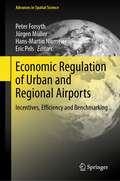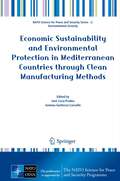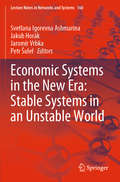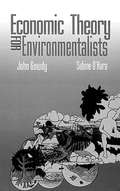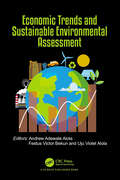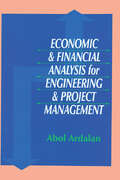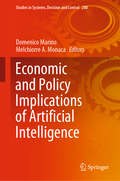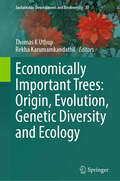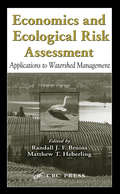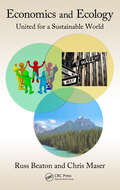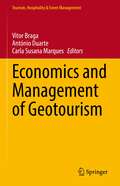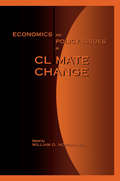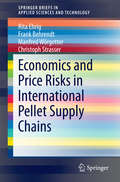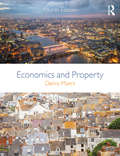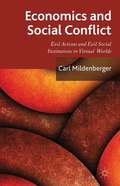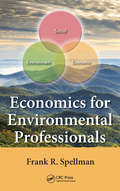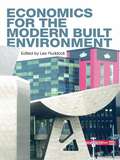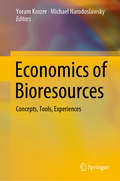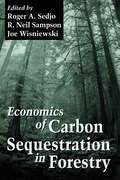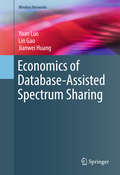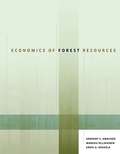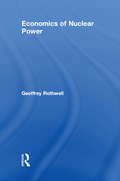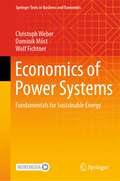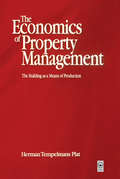- Table View
- List View
Economic Regulation of Urban and Regional Airports: Incentives, Efficiency and Benchmarking (Advances in Spatial Science)
by Peter Forsyth Jürgen Müller Hans-Martin Niemeier Eric PelsThis book offers new insights into the theory and practice of economic airport regulation. In light of recent developments in aviation markets and policy, and the debate on airport regulation and benchmarking, it offers case studies on various aspects of economic regulation of city and regional airports. Written by experts in the field, the volume features contributions on the theory of regulation and benchmarking, as well as case studies on recent experiences in Europe and Latin America.This book is divided into three parts: Part I provides the theoretical background for the study of airport regulation and regulatory systems. Competition at airports is discussed, as are common forms of regulation and potential pitfalls. Part II addresses benchmarking, as benchmarking is often applied as an input to the regulatory process. Although benchmarking is necessary, reviews of how benchmarking is applied in the literature and in practice show that improvements can be made. Part III provides case studies on real-world examples.Addressing the question of whether and how European airport regulators set incentives for efficiency, and how benchmarking is used in the regulatory process, this book is an important contribution to the development of the transport industry in Europe and Latin America. It will appeal to scholars and students in transport economics, regional economics and related fields, as well as to practitioners and policy makers in the transport industry.
Economic Sustainability and Environmental Protection in Mediterranean Countries through Clean Manufacturing Methods
by José Coca-Prados Gemma Gutiérrez-CervellóThis volume, with contributions from a team of multi-disciplinary team experts, addresses the economic sustainability and clean manufacturing methods to deal with the challenges that water scarcity and water quality are imposing on many countries, particularly on Mediterranean arid areas, that are threatening their economic and social development. Water plays a crucial role in industry, agriculture and daily life. Its use has increased ten-fold between 1900 and 2000. On a global scale, about 70 % of clean water from available sources is used for agricultural purposes, primarily irrigation, the rest of it being used for domestic and industrial purposes. With the actual demographic and economic trends, it is expected that by 2025, two-thirds of the world population will live in water-stressed areas and it is expected a 40 % increase in water consumption.
Economic Systems Analysis and Assessment
by Andrew P. Sage William B. RouseAn Authoritative Introduction to a Major Subject in Systems Engineering and Management This important volume fills the need for a textbook on the fundamentals of economic systems analysis and assessment, illustrating their vital role in systems engineering and systems management. Providing extensive coverage on key topics, it assumes no prior background in mathematics or economics in order to comprehend the material. The book is comprised of five major parts: Microeconomics: a concise overview that covers production and the theory of the firm; theory of the consumer; market equilibria and market imperfections; and normative or welfare economics, including imperfect competition effects and consumer and producer surplus Program Management Economics: discusses economic valuation of programs and projects, including investment rates of return; cost-benefit and cost-effectiveness analysis; earned value management; cost structures and estimation of program costs and schedules; strategic and tactical pricing issues; and capital investment and options Cost Estimation: reviews cost-estimation technologies involving precedented and unprecedented development, commercial-off-the-shelf (COTS) software, software reuse, application generators, and fourth-generation languages Strategic Investments in an Uncertain World: addresses alternative methods for valuation of firms including Stern Stewart's EVA, Holt's CFROI, and various competing methodologies Contemporary Perspectives: covers ongoing extensions to theory and practice that enable satisfactory treatment of the increasing returns to scale, network effects, and path-dependent issues generally associated with contemporary ultra-large-scale telecommunications and information networks Also discussed in this comprehensive text are normative or welfare economics and behavioral economics; COCOMO I and II and COSYSMO as examples of a cost model; and options-based valuation models and valuation of information technology intensive enterprises. Economic Systems Analysis and Assessment serves as an ideal textbook for senior undergraduate and first-year graduate courses in economic systems analysis and assessment, as well as a valuable reference for engineers and managers involved with information technology intensive systems, professional economists, cost analysts, investment evaluators, and systems engineers.
Economic Systems in the New Era: Stable Systems in an Unstable World (Lecture Notes in Networks and Systems #160)
by Svetlana Igorevna Ashmarina Jakub Horák Jaromír Vrbka Petr ŠuleřThis proceedings book presents outcomes of the Innovative Economic Symposium – 2020 organized by the Institute of Technology and Business in České Budějovice (VŠTE) in Russia in collaboration with two universities: Financial University under the Government of the Russian Federation (Moscow) and Samara State University of Economics (Samara). The symposium aims to bring together experts and young scientists in economy, management, international relations, finance, marketing, and professional education from Asian and European countries, to share knowledge and experience and discuss issues related to stable economic development, international business, entrepreneurship, Industry 4.0, cooperation between educational and business structures, strategic decision-making, and processes of economic globalization and fragmentation. The book consists of two parts corresponding to the thematic symposium areas. The book content covers two sections: stable development in unstable world and globalization and fragmentation forces of the current world economy. The main topics included in the book are as follows: - Where is the world moving to and where is the economy in it? - Institutionalization of innovations. - Network architecture of economic relations. - Competences for the future. - Smart change management. - Monetary and fiscal policy development as a factor of economic modernization. - Role of international trade in the economy globalization. - Impact of globalization and economic fragmentation on the enterprise’s internal environment. - Financial conditions for entrepreneurship under the economic modernization. - Impact of scientific and technological progress on globalization and fragmentation of the economy.
Economic Theory for Environmentalists
by John GowdyEconomic Theory for Environmentalists is a much-needed and heralded new book that examines the implications of neoclassical economic theory and how it relates to the environment and environmental activity. It addresses the ongoing conflict between market forces and environmental integrity and explains how neoclassical economic theory views the relationship between economic activity and the natural world. Each chapter outlines the concepts of economic theory and the relevance of its environmental and policy implications. It focuses on both micro and macro-economics. Policy tools such as price and income elasticities, consumer surplus and methods for measuring the economic value of environmental resources are discussed. A case study which examines a range of policy options is presented. Examples are also given throughout the text to illustrate regional and international policy questions. Presented in a simple and easy to understand manner, this valuable book is suited for anyone dealing with environmental, economic, or policy issues.
Economic Trends and Sustainable Environmental Assessment
by Andrew Adewale Alola Festus Victor Bekun Uju Violet AlolaThe book ‘Economic Trends and Sustainable Environmental Assessment’ attempts to x-ray the economic and socioeconomic activities, and cultural or behavioural aspects from the concept of sustainability by employing several related research scenarios spanning the micro-, meso-, and macro-level approaches.Given the increasing awareness of the importance of social, economic, environmental, and even now human sustainability aspects to a sustainable global (present) future, the relevance of the dimensions of Sustainable Development Goals (SDGs) need to be consistently examined. For instance, decades of climate-related disasters which have increasingly endangered humans are the reason for ongoing advanced advocacy, policy, and research towards achieving an environmentally sustainable or net zero emission (NZE) future.Thus, considering the illustration of the theoretical and practical dimensions of the connectedness of the economic and socioeconomic aspects with environmental dimensions, this book should hugely benefit students, researchers, and policymakers to further understand and solve some of the world’s lingering challenges.
Economic and Financial Analysis for Engineering and Project Management
by Abol ArdalanEconomic and Financial Analysis for Engineering and Project Management is for engineers and others who must analyze the financial and economic ramifications of producing and sustaining capital projects. Unlike other books in the field, it offers straightforward and lucid explanations of all main formulas needed to carry out financial analyses. The
Economic and Policy Implications of Artificial Intelligence (Studies in Systems, Decision and Control #288)
by Domenico Marino Melchiorre A. MonacaThis book presents original research articles addressing various aspects of artificial intelligence as applied to economics, law, management and optimization. The topics discussed include economics, policies, finance, law, resource allocation strategies and information technology. Combining the input of contributing professors and researchers from Italian and international universities, the book will be of interest to students, researchers and practitioners, as well as members of the general public interested in the economic and policy implications of artificial intelligence.
Economically Important Trees: Origin, Evolution, Genetic Diversity and Ecology (Sustainable Development and Biodiversity #37)
by Thomas K Uthup Rekha KarumamkandathilThe edited volume deals with the origin, evolution, genetic diversity, commercial, and cultural aspects of selected tree species such as Rubber, Pine, Poplar, Almond, Cashew, Teak, Olive, Eucalyptus, Mango, Jack, Fig, Sandalwood and Ashoka. It covers major aspects of the altered gene pool of each tree species, its impact on biodiversity, the current scenario, and the strategies to protect and conserve the wild progenitors of these trees. Human interventions in the evolution and development of these economically important trees began at least four thousand years ago. Over these years, significant improvements in the traits of economic value were achieved for most of these tree species. However, the long history of domestication and the selective breeding pressure applied to their wild progenitors accelerated the loss of biodiversity, resulting in reduced genetic diversity and shrunken germplasm resources of these domesticated species. The book portrays the novel dimensions of the propitiousness of tree domestication and the interesting history behind it, which is interlaced with the development of civilizations, religions, local traditions, medicine and cuisine. This book is of interest to teachers, researchers, biodiversity experts, and policymakers. It can be used as additional reading material for undergraduate and graduate students of forestry, ecology, genetics, and environmental sciences. The book also serves as an interesting and useful read for national and international agricultural scientists, as well as historians and the general public.
Economics and Ecological Risk Assessment: Applications to Watershed Management (Environmental And Ecological Risk Assessment Ser. #Vol. 5)
by Randall J. F. Bruins Matthew T. HeberlingWith contributions from a wide array of economists, ecologists, and government agency professionals, Economics and Ecological Risk Assessment: Applications to Watershed Management provides a multidisciplinary approach to environmental decision-making at a watershed level. It introduces the fields of ecological risk assessment (ERA) and economic ana
Economics and Ecology: United for a Sustainable World (Social Environmental Sustainability)
by Chris Maser Charles R. BeatonThe earth, our home, is in crisis. There are two sides to this crisis-our global economy, and its effect on the ecology of our home planet. Despite conventional thinking that typical monetary and fiscal manipulations will put us back on the path of economic growth, the reality is not that simple. Meanwhile, the natural environment is sending unmist
Economics and Management of Geotourism (Tourism, Hospitality & Event Management)
by Vitor Braga Carla Susana Marques António DuarteThis book covers all aspects of the economics and management of geotourism, an increasingly important sector of nature tourism that focuses on the geology and landscape of different territories, providing a pleasurable and educational tourist experience. Geotourism is a sustainable form of tourism that has the potential to deliver significant benefits to host communities. To date, however, geotourism has been examined primarily from the natural sciences perspective, to the detriment of issues related to local social and economic impacts, inter-organizational collaboration, tourist responses, and community participation. This book therefore fills a major gap in the literature. While a key focus is the impacts of geotourism on economic and social development processes and the quality of life of local populations, detailed attention is also devoted to topics such as geopark and geosystem management, innovative and entrepreneurial strategies in geotourism, and territorial marketing. In addition, readers will gain a clear understanding of the extent to which the opportunities and challenges facing geotourism reflect current trends in the tourist industry as a whole.
Economics and Policy Issues in Climate Change
by William D. NordhausAlthough the negotiation of the Kyoto Protocol focused world attention on the global climate, it was just one step in the ongoing process of addressing climate change in all its facets. Research by the UN's Intergovernmental Panel on Climate Change (IPCC) has been ongoing since 1988. An extensive IPCC Working Group report published in 1995 examined the economic and social aspects of climate change. In this volume, eminent analysts assess that IPCC report and address the questions that emerge from it. The result is an instructive and cogent look at the realities of climate change and some methods (and difficulties) of dealing with them. William Nordhaus's introduction establishes the context for the book. It provides basic scientific background on climate change, reviews the IPCC's activities, and explains the genesis of the analyses. Subsequent contributions fall into two categories. Early chapters review analytical issues critical to social and economic understanding of climate change. A second set of chapters address specific economic questions surrounding climate-change policy. The result is an original and significant contribution to the evolving debate on this crucial hot-button topic.
Economics and Price Risks in International Pellet Supply Chains
by Rita Ehrig Frank Behrendt Manfred Wörgetter Christoph StrasserThe aim of this book is to investigate critical economic aspects and price risks along international pellet supply chains and to offer new insights into the interconnections between the sector, the various supply risks within the market and guidelines for de-risking biomass supply chains. It provides three real case studies as practical examples of determining actual supply costs from resource production to end-user and in doing so identifies and analyzes general economic performance indicators and price drivers for biomass supply chains. It also investigates the impact of several risks like raw material prices, exchange and freight rates on total prices. As a result, the reader learns how price risks are hedged to avoid project defaults and how to achieve the renewable energy targets of the end-user. Practical guidelines for recognising critical economic issues in biomass supply chains and for applying adequate de-risk strategies are also provided. Offering insights to a broad audience, this book is intended for researchers and professionals interested in renewable energy systems, biomass resource management and supply chain management. It also provides an invaluable resource to policy makers seeking guidelines for successfully managing the introduction of sustainable biomass projects.
Economics and Property: The Estates Gazette Guide
by Danny Myersa clear and easy-to-read introduction to any property economics module in a degree leading to a profession in real estate, surveying, construction and other related built environment fields Full colour figures and packed with features such as: glossary, chapter objectives and summaries, glossary, case studies, tutorial readings
Economics and Social Conflict: Evil Actions and Evil Social Institutions in Virtual Worlds
by Carl D. MildenbergerThis book brings to life the classic thought experiment of a natural state. Provides data on the economic aspects of social conflict of 400.000 people living in a virtual anarchy; showing evil actions and rules exist from an economic perspective. Non-instrumental violence has economic effects and inciting people to fight are not overcome in time.
Economics for Environmental Professionals
by Frank R. SpellmanEnvironmental professionals are often called upon to find solutions to environmental degradation problems or to lead the way in planning to prevent them. Because they come mainly from the environmental and science disciplines, most environmental professionals have limited training in the fundamentals of economics. This book is designed to provide t
Economics for the Modern Built Environment
by Les RuddockRecent decades have seen a major social and economic changes across the developed world and consequent changes in the construction and property industries. The discipline of construction economics needs to respond to this. For instance, the importance of sustainable development has become recognised, as has the need to increasingly master the medium and long-term consequences of construction, not only in the production but also in the management of buildings across their whole life-cycle. And the new focus on the service rendered by buildings, as distinct from the buildings themselves, has prompted a new approach to the construction and property industries. Any economic analysis of these sectors has to take account of all the participants involved in the life-cycle of building structures – not only in the design and construction, but also in the operation, maintenance, refurbishment and demolition of property. This innovative new book draws on the work of the Task Group of the CIB (International Council for Research and Innovation) on Macroeconomics for Construction. It pulls together discussions of mesoeconomic and macroeconomic models and methodologies in construction economics and presents an exciting approach to the analysis of the operation and function of the construction and property sector within the economy. Graduate students and researchers will find it an invaluable work.
Economics of Bioresources: Concepts, Tools, Experiences
by Yoram Krozer Michael NarodoslawskyThis fundamental book provides a cross-sectoral, multi-disciplinary view on the biobased economy. It explains opportunities for the value-adding production and use of bioresources, while also discussing the main drivers and obstacles involved. The book is divided into three major parts, the first of which introduces readers to the basics of bioresource economics and engineering. In terms of economics, it discusses decision-making from the policy, producer, investor, and citizen perspectives; in terms of engineering, it addresses key technologies and the processing of bioresources, as well as the development of biorefineries for high-value products on large and small scales. In turn, the book’s second part presents cases focused on different types of energy use, and written by practitioners. The cases illustrate the businesses and technologies involved, as well as the roles of citizens, social organisations and policies. The book’s third and last part highlights opportunities in sustainable agriculture, valuable industrial products and innovative services, while also outlining key conditions for success. Written by a team of scholars and practitioners from various engineering, natural-science and social-science disciplines, the book is primarily intended for undergraduate and graduate students, and for practitioners in business and policy who wish to explore the sustainable production and use of bioresources. All theoretical issues are explained with the aid of real-world examples, making the content highly accessible.
Economics of Carbon Sequestration in Forestry
by Terry J. LoganSince the 1992 Earth Summit, there have been increased efforts on an international scale to address global climate change. Reducing the increased levels of CO2 and other "greenhouse gases," which are believed to be contributing to this climatic change, will require major effort on the part of the world's governments. This means that the environmental, economic, social, and political consequences of climate change must be understood, and that strategies to mitigate climate change must also address these issues.The workshop detailed in this book concentrated on how economic principles and analysis could contribute to the planning of forestry projects aimed at affecting terrestrial carbon balances. More than 30 international scientists came together for one week near Stockholm, Sweden and divided into working groups charged with addressing a specific issue and preparing a paper within this time frame. This book contains the majority of papers presented at this meeting, and includes both the working group papers and the individually presented papers.
Economics of Database-Assisted Spectrum Sharing
by Yuan Luo Lin Gao Jianwei HuangThis book examines the interaction between the technical and economic issues in database-assisted dynamic spectrum networks. It explains various business models for different network settings, analyzing the user behaviors and system equilibrium under each model. With the explosive growth of mobile devices and bandwidth-hungry applications, radio spectrum is becoming increasingly congested and scarce. Database-assisted dynamic spectrum sharing is a promising technology for solving the problem of spectrum scarcity and congestion by allowing unlicensed mobile devices to dynamically access the under-utilized licensed spectrum resources through the assistance of a database. Database-assisted spectrum sharing network architecture has received wide and enthusiastic support from spectrum regulators, standards bodies, and industrial organizations. This book serves as a resource for researchers in white space communications and networking, for regulators in the wireless industry, and for graduate students and senior undergraduate students taking a course on network economics.
Economics of Forest Resources
by Gregory S. Amacher Markku Ollikainen Erkki KoskelaThe field of forest economics has expanded rapidly in the last two decades, and yet there exists no up-to-date textbook for advanced undergraduate-graduate level use or rigorous reference work for professionals. Economics of Forest Resources fills these gaps, offering a comprehensive technical survey of the field with special attention to recent developments regarding policy instrument choice and uncertainty. It covers all areas in which mathematical models have been used to explain forest owner and user incentives and government behavior, introducing the reader to the rigor needed to think through the consequences of policy instruments. Technically difficult concepts are presented with a unified and progressive approach; an appendix outlines the basic concepts from calculus needed to understand the models and results developed. The book first presents the historical and classic models that every student or researcher in forest economics must know, including Faustman and Hartman approaches, public goods, spatial interdependence, two period life-cycle models, and overlapping generations problems. It then discusses topics including policy instrument choice, deforestation, biodiversity conservation, and age-class based forest modeling. Finally, it surveys such advanced topics as uncertainty in two period models, catastrophic risk, stochastic control problems, deterministic optimal control, and stochastic and deterministic dynamic programming approaches. Boxes with empirical content illustrating applications of the theoretical material appear throughout. Each chapter is self-contained, allowing the reader, student, or instructor to use the text according to individual needs.
Economics of Nuclear Power
by Geoffrey RothwellThis book is a unique introduction to the economic costs of nuclear power. It examines the future of the nuclear power industry and unpacks the complicated relationships between its technical, economic and political variables. It does so by modelling the costs, risks and uncertainties of one of the world’s most opaque industries using micro-econometrics, econometrics, and cost engineering. Economics of Nuclear Power examines the very important costs of externalities (storing of nuclear waste and the impact of a Chernobyl or Fukushima event) and compares those to the externalities of alternative carbon based energies (oil, coal, natural gas). With over 100 tables and figures this book details nuclear power production around the world - present and planned, providing a completely global focus. It also includes an overview of the past 70 years of international nuclear power developments. This book is essential reading for students, scholars and professionals interested in energy economics, nuclear engineering and energy policy.
Economics of Power Systems: Fundamentals for Sustainable Energy (Springer Texts in Business and Economics)
by Christoph Weber Wolf Fichtner Dominik MöstIn order to manage the transition towards a sustainable future electricity system, an in-depth understanding of the key technological, economic, environmental and societal drivers for electricity markets is required. Suitable for advanced undergraduate and graduate students, this textbook provides an overview of these drivers and introduces readers to major economic models and empirical evidence for the study of electricity markets and systems. Readers will learn about electricity generation, demand, transport, and storage, as well as the fundamentals of grid and electricity markets in Europe. By introducing them to state-of-the-art models from operations research and economics, the book provides a solid basis for analytical insights and numerical modeling. Furthermore, the book discusses the policy instruments and design choices for electricity market regulation and sustainable power system development, as well as the current challenges for smart energy systems.
Economics of Property Management: The Building As A Means Of Production
by Herman Tempelmans Plat Frank HeynickThe economic analysis of a building is a complex subject and traditionally it has focused on a single aspect of the structure or a single part of the construction process. Dr Tempelmans Plat is a leading proponent of a new methodology which focuses on the building as a stock of services to be supplied over a long lifespan. This method is more realistic since it takes into account the changes in use and the adaptation of the building over its life. This book will be the first to make this method comprehensible to a wide audience of postgraduate students and professionals in the field of construction economics.
